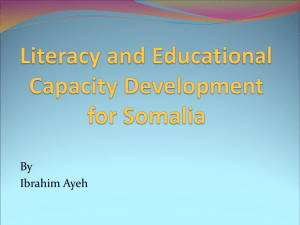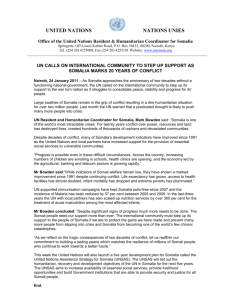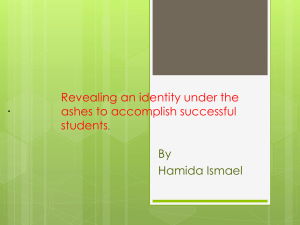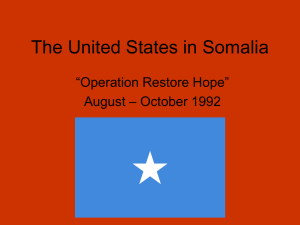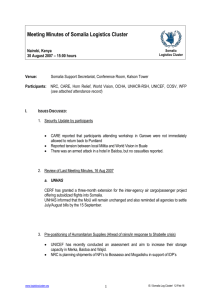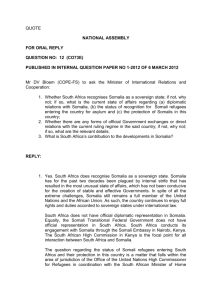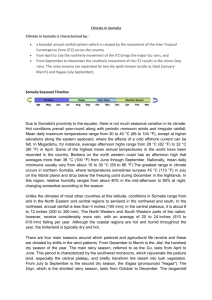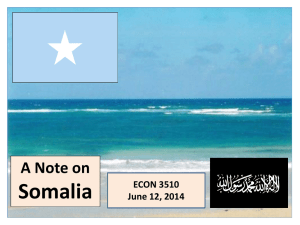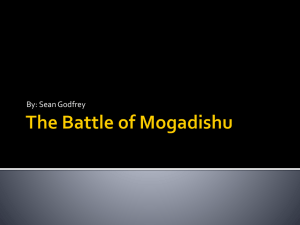Somalia Demilitarization Planning Unit
advertisement
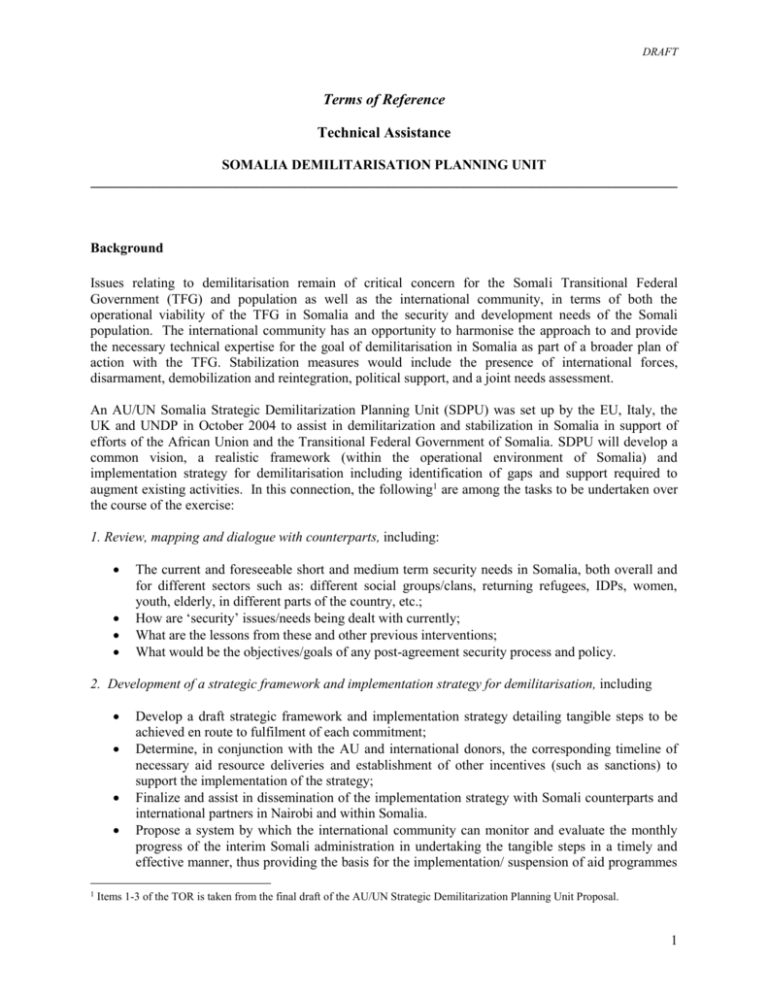
DRAFT Terms of Reference Technical Assistance SOMALIA DEMILITARISATION PLANNING UNIT _____________________________________________________________________________________ Background Issues relating to demilitarisation remain of critical concern for the Somali Transitional Federal Government (TFG) and population as well as the international community, in terms of both the operational viability of the TFG in Somalia and the security and development needs of the Somali population. The international community has an opportunity to harmonise the approach to and provide the necessary technical expertise for the goal of demilitarisation in Somalia as part of a broader plan of action with the TFG. Stabilization measures would include the presence of international forces, disarmament, demobilization and reintegration, political support, and a joint needs assessment. An AU/UN Somalia Strategic Demilitarization Planning Unit (SDPU) was set up by the EU, Italy, the UK and UNDP in October 2004 to assist in demilitarization and stabilization in Somalia in support of efforts of the African Union and the Transitional Federal Government of Somalia. SDPU will develop a common vision, a realistic framework (within the operational environment of Somalia) and implementation strategy for demilitarisation including identification of gaps and support required to augment existing activities. In this connection, the following1 are among the tasks to be undertaken over the course of the exercise: 1. Review, mapping and dialogue with counterparts, including: The current and foreseeable short and medium term security needs in Somalia, both overall and for different sectors such as: different social groups/clans, returning refugees, IDPs, women, youth, elderly, in different parts of the country, etc.; How are ‘security’ issues/needs being dealt with currently; What are the lessons from these and other previous interventions; What would be the objectives/goals of any post-agreement security process and policy. 2. Development of a strategic framework and implementation strategy for demilitarisation, including 1 Develop a draft strategic framework and implementation strategy detailing tangible steps to be achieved en route to fulfilment of each commitment; Determine, in conjunction with the AU and international donors, the corresponding timeline of necessary aid resource deliveries and establishment of other incentives (such as sanctions) to support the implementation of the strategy; Finalize and assist in dissemination of the implementation strategy with Somali counterparts and international partners in Nairobi and within Somalia. Propose a system by which the international community can monitor and evaluate the monthly progress of the interim Somali administration in undertaking the tangible steps in a timely and effective manner, thus providing the basis for the implementation/ suspension of aid programmes Items 1-3 of the TOR is taken from the final draft of the AU/UN Strategic Demilitarization Planning Unit Proposal. 1 DRAFT and other incentives (such as sanctions); 3. Coordination of the implementation of the joint strategy for demilitarisation, including: Develop and provide the necessary support for coordination mechanisms for Somali and international partners. In line with the above, assist and advise on the establishment of Somali counterpart structures on an area basis at both administration and grassroots levels. Identify and facilitate provision of technical support to Somali counterpart structures and institutions in order to strengthen Somali ownership, participation and management. World Bank Technical Assistance As part of this overall effort at preparing a demilitarization strategy for Somalia, the technical expert will be hired by the World Bank to conduct the following tasks: 1. Work with SDPU and provide inputs into the preparation of the overall demilitarization strategy as appropriate, with a particular focus on overall DDR strategy and institutional framework/arrangements as well as social and economic reintegration. 2. Report regularly to the Bank team on the development of the demilitarization strategy and participate in any relevant meetings/workshops/missions to Somalia. 3. Prepare a short strategy paper (15-20 pages), outlining recommendations as to where the Bank could provide additional support on DDR activities in Somalia, based on the AU/UN demilitarization strategy and an analysis of other donors/partners’ support and the situation in Somalia. This strategy paper will briefly review and evaluate past literature and projects in Somalia and include consultations with key partners/donors and Somali stakeholders (as appropriate). Deliverables As part of the assignment, the expert will be expected to produce: 1. Written inputs into AU/UN demilitarization strategy as discussed and agreed with SDPU. 2. After two weeks: A timetable and short proposal (5 pages) on how the Bank best can support the AU/UN demilitarization strategy in the continuum, including technical inputs. 3. At the end of assignment: Bank strategy for DDR support in Somalia (15-20 pages), with practical and realistic suggestions on how best to proceed, given the Bank’s mandate in operating in Somalia and support that other partners may be providing. This will include an evaluation of the situation on the ground and of existing projects, including the work of the SDPU, as well as local and international capacities. Existing literature and projects will be reviewed and consultations will be held with key stakeholders, both Somali and international. Logistics The consultant will be based in Nairobi. Missions to Addis Ababa, Ethiopia (AU HQ) and Somalia may need to be undertaken. The consultant will be responsible for facilitating his/her own administrative, logistics and security-related elements (travel authorization and security clearance) as part of the 2 DRAFT consultancy, including visits to Somalia. The consultant will follow UN security rules and regulations strictly during any missions to Somalia. The consultant will need to liaise closely with the AU/UN planning unit that has been established. In addition, the person will also work closely with the Bank’s ESSD family (AFTS2) as well as the Conflict Prevention and Reconstruction Team. The consultant will provide a hard and electronic copy of all required documents to Priya Gajraj (pgajraj@worldbank.org) and Per Egil Wam (pwam@worldbank.org). Timing The consultancy is for a period of 4 weeks, beginning on February 15, 2005. Potential follow-on work will be determined during this period (based on deliverable #2), and will depend on technical needs and funding. 3
